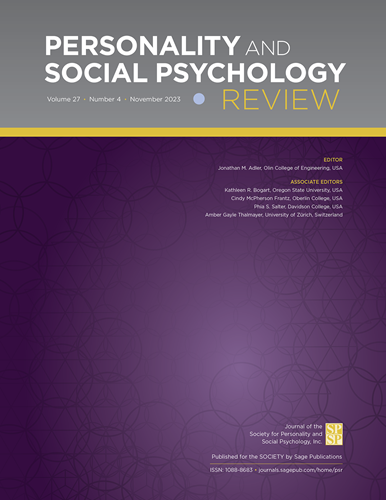“My Aim Is True”: An Attribution-Identity Model of Ally Sincerity
IF 10.4
1区 心理学
Q1 PSYCHOLOGY, SOCIAL
引用次数: 0
Abstract
Academic AbstractAdvantaged group allies have multiple motives for supporting equality, raising questions about their sincerity. We draw upon the covariation model of attributions to explain how disadvantaged group members make attributions about whether advantaged group “allies” are sincerely motivated to empower the disadvantaged group. We propose an Attribution-Identity Model of Sincerity (AIMS) which posits that disadvantaged group members view advantaged group members as sincere allies when they support equality in the presence of inhibitory causes and in the absence of facilitative causes, exceed expectations for the advantaged group, and provide support across time and contexts. Furthermore, those who identify strongly with their disadvantaged group and perceive intergroup inequality as illegitimate are most motivated to ascertain the sincerity of advantaged group members’ allyship. AIMS suggests how members of disadvantaged groups seek to maximize benefits and minimize risks of advantaged group members’ allyship.Public AbstractAdvantaged group members (e.g., men, White Americans) can act as allies for disadvantaged groups (e.g., women, Americans belonging to minoritized racial groups), but members of disadvantaged groups sometimes have reason to question whether their motives are sincere. We argue that members of disadvantaged groups view advantaged group allies as more sincere when they support equality when they do not stand to benefit from it and even when they stand to lose. We also argue that members of disadvantaged groups view advantaged group allies as more sincere when their support for equality goes beyond expectations for their advantaged group, consistently over time, and is not limited to particular situations, forms, or contexts. Members of disadvantaged groups like sincere allies, want to work with them, and feel safe around them. Sincere allies also serve as moral exemplars to other members of advantaged groups."我的目标是真实的盟友诚意的归因-认同模型
学术论文摘要 弱势群体盟友支持平等的动机多种多样,这让人怀疑他们的诚意。我们借鉴归因的共变模型来解释弱势群体成员如何对优势群体 "盟友 "是否真心支持弱势群体进行归因。我们提出了 "真诚归因-认同模型"(AIMS),该模型假定,当优势群体成员在存在抑制性原因或不存在促进性原因的情况下支持平等、超出对优势群体的期望并在不同时间和背景下提供支持时,弱势群体成员会将优势群体成员视为真诚的盟友。此外,那些强烈认同其弱势群体并认为群体间不平等是非法的人,最有动力去确定优势群体成员结盟的诚意。AIMS 建议弱势群体成员如何寻求优势群体成员盟友关系的利益最大化和风险最小化。公开摘要优势群体成员(如男性、美国白人)可以充当弱势群体(如女性、属于少数种族群体的美国人)的盟友,但弱势群体成员有时有理由质疑他们的动机是否真诚。我们认为,当优势群体的盟友支持平等时,弱势群体的成员会认为优势群体的盟友更有诚意,因为他们不会从中获益,甚至会蒙受损失。我们还认为,如果优势群体盟友对平等的支持超出了他们对优势群体的期望,并且长期持续,不局限于特定的情况、形式或背景,那么弱势群体成员就会认为优势群体盟友更真诚。弱势群体成员喜欢真诚的盟友,愿意与他们合作,在他们身边感到安全。真诚的盟友也是其他优势群体成员的道德楷模。
本文章由计算机程序翻译,如有差异,请以英文原文为准。
求助全文
约1分钟内获得全文
求助全文
来源期刊

Personality and Social Psychology Review
PSYCHOLOGY, SOCIAL-
CiteScore
19.00
自引率
1.90%
发文量
20
期刊介绍:
Title: Personality and Social Psychology Review (PSPR)
Journal Overview:
Official journal of SPSP, the Society for Personality and Social Psychology, Inc.
Premiere outlet for original theoretical papers and conceptual review articles in all areas of personality and social psychology
Features stimulating conceptual pieces identifying new research directions and comprehensive review papers providing integrative frameworks for existing theory and research programs
Topics Covered:
Attitudes and Social Cognition: Examines the inner workings of the human mind in understanding, evaluating, and responding to the social environment
Interpersonal and Group Processes: Explores patterns of interaction and interdependence characterizing everyday human functioning
Intergroup Relations: Investigates determinants of prejudice, conflict, cooperation, and harmonious relationships between social groups
Personality and Individual Differences: Focuses on causes, assessment, structures, and processes giving rise to human variation
Biological and Cultural Influences: Studies the biological and cultural mediation of social psychological and personality processes
 求助内容:
求助内容: 应助结果提醒方式:
应助结果提醒方式:


